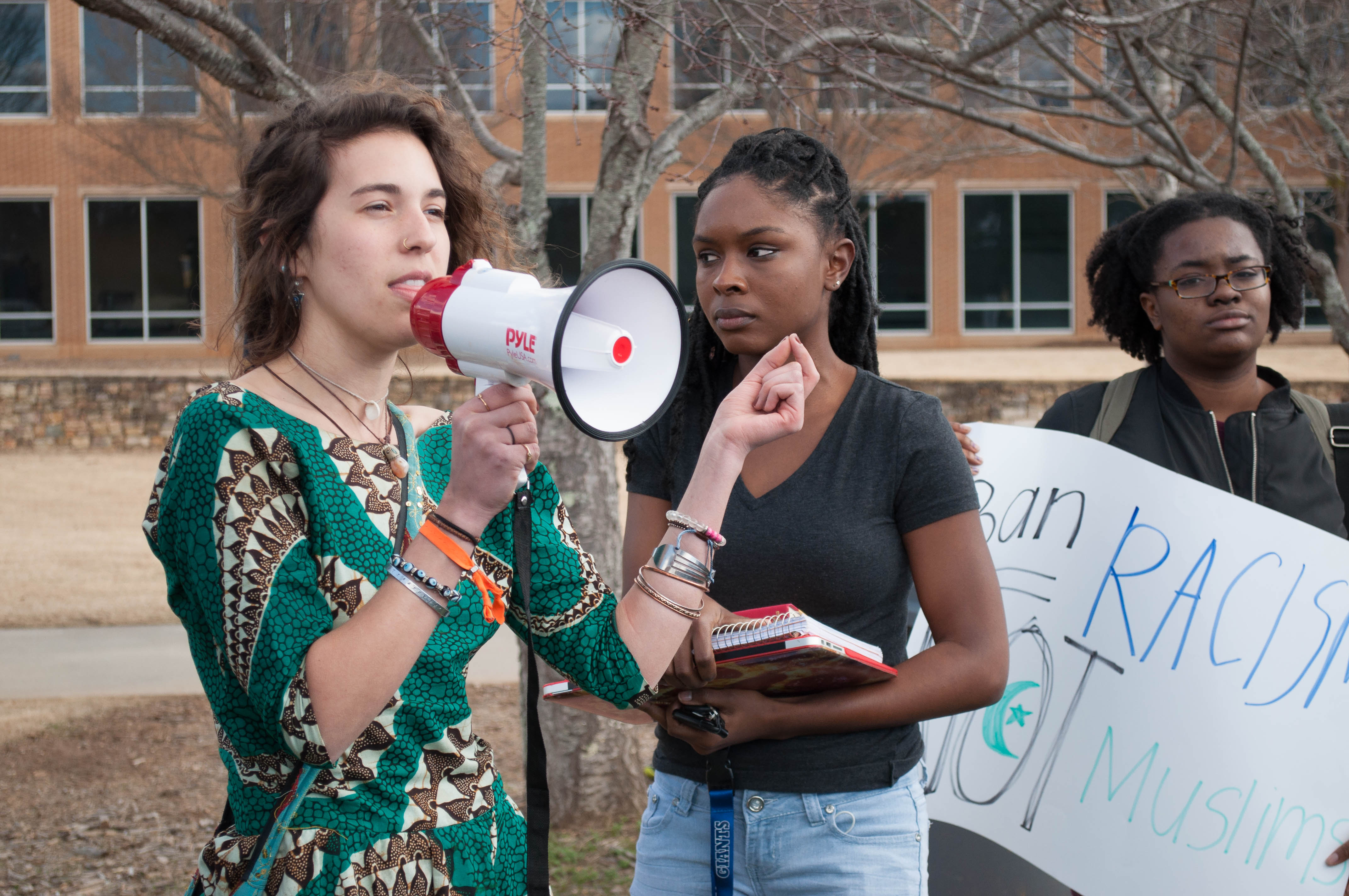President Donald Trump’s recent executive order, which would limit travel from seven Muslim-majority countries, sparked confusion and unease among members of the Kennesaw State community — concerns which university officials have taken steps to address.
The executive order was signed by the president on Jan. 27, but it was suspended Feb. 3 by Judge James Robart of the Federal District Court and is currently being held up in federal court.
If allowed to resume, it would restrict nationals from Iran, Iraq, Libya, Syria, Somalia, Sudan and Yemen from entering the country for 90 days. It would also suspend the U.S. Refugee Admissions Program for 120 days and states that, when the refugee program resumes, it would give priority to those claiming “religious-based persecution,” as long as it is a minority religion in their country.
According to the university’s Division of Global Affairs, KSU has 52 students currently enrolled who are foreign nationals from one of the affected countries cited in the executive order. Of these, two are present on student visas and the rest are permanent U.S. residents.
“At this time, it does not appear that any of these students have been directly impacted by the executive order,” said Tammy DeMel, a spokeswoman for KSU. She said the university remains committed to promoting an inclusive environment for all students.
The Office of President Sam Olens echoed this sentiment in an emailed statement issued to students, faculty and staff on Jan. 30.
“We recognize that many of you have questions related to this action,” Olens’ statement read. “Please know that the safety and well-being of our campus community is our top priority. We are closely monitoring this evolving situation and are coordinating with the University System of Georgia and all relevant state and federal agencies.”
Although the university states that no student has had his or her visa status directly altered by the ban, the Department of International Student and Scholar Services advised against international travel for these students.
“As a result of this executive order, we do not recommend travel outside of the U.S. for anyone who holds a passport as a national of Iran, Iraq, Libya, Somalia, Sudan, Syria, and Yemen,” the department’s website reads.
The travel order ignited outrage among those who viewed it as discriminatory and xenophobic, which resulted in a student-led demonstration march across campus Feb. 1 in support of the immigrants and refugees affected by the ban.

Yen Rodriguez, assistant director of Race, Culture and Ethnicity Programs for the Department of Student Engagement, was present at the demonstration. Rodriguez said that the Office of Multicultural Student Affairs is available as a safe space for students to express their concerns.
“Please come share with us your thoughts, your fears, your ideas, whatever agendas you have to move forward,” Rodriguez said. “We will have that space for you,”
The Office of Multicultural Student Affairs also partnered with various departments around campus to host support programs and services for students feeling confused or concerned about the order. Among the programs hosted were multiple discussions about the ban and what it means for the campus community, as well as extended counseling hours.
The Muslim Students Association offered its support to anyone experiencing discrimination.
“We are here for anyone who ever needs anything, including support for Muslims, refugees and other minorities alike being treated with injustice,” said Ashley Williams, president of the association.
Most of Georgia’s congressional representatives have expressed support for the travel order, including Rep. Barry Loudermilk, who represents the portion of Cobb County in which KSU sits.
“He’s just taking the step to ensure that we have proper vetting for anyone coming to the U.S. from these countries,” Loudermilk said in a statement to The Atlanta Journal-Constitution. “With Syria, how do you vet somebody who is coming from a country that’s in the midst of a civil war who has no documentation? You can’t do it. It’s impossible.”
Students with questions or concerns about their visa status are encouraged to contact Mark Forehand, director of International Student and Scholar Services, at mforeha1@kennesaw.edu.



Sadly, Trump’s contentious issue is yet one more that makes being an international student difficult, on top of our already complex culture and language. Assimilation assistance must come from numerous sources to aid these young people embarking on life’s journey. Most struggle in their efforts and need guidance from schools’ international departments, immigration protection, host families, concerned neighbors and fellow students, and even informative books to extend a cultural helping hand so we all have a win-win situation.
One such new award-winning worldwide book/ebook that reaches out to help anyone coming to the US is “What Foreigners Need To Know About America From A To Z: How to Understand Crazy American Culture, People, Government, Business, Language and More.” It is used in foreign Fulbright student programs and endorsed worldwide by ambassadors, educators, and editors. It also identifies “foreigners” who became successful in the US and how they’ve contributed to our society, including students.
A chapter on education explains how to be accepted to an American university and cope with a confusing new culture, friendship process and daunting classroom differences. Some stay after graduation. It has chapters that explain how US businesses operate and how to get a job (which differs from most countries), a must for those who want to work with/for an American firm here or overseas.
It also has chapters that identify the most common English grammar and speech problems foreigners have and tips for easily overcoming them, the number one stumbling block they say they have to succeeding here.
Good luck to all wherever you study or wherever you come from, because that is the TRUE spirit of the American PEOPLE, not a few in government who have the loudest voice!